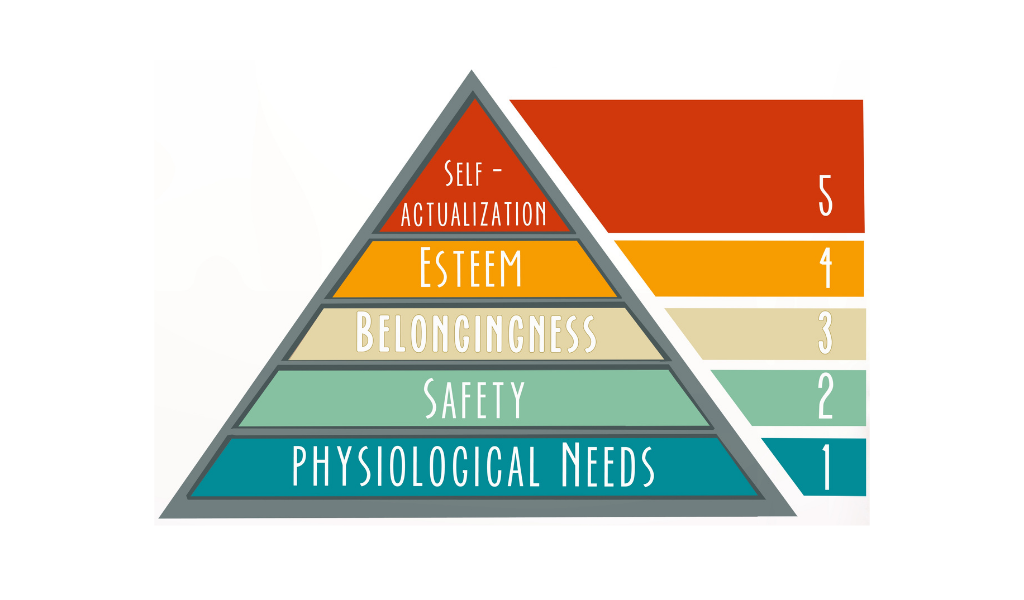How a sense of belonging creates a more peaceful life for you and your kids
Belonging matters to animals, mammals, and humans alike. Humans, in particular, have evolved to need connection with other humans. This goes for any person, young, old, parent or not, married or single.
When we feel we belong, we feel grounded and calm because we subconsciously know we are safe and secure in ourselves and our surroundings.
In fact, according to Maslow, “love and belonging” is one of the top five basic needs of humans.

The difference between “fitting in” and “belonging”
Dr. Brené Brown famously said:
“Fitting in is one of the greatest barriers to belonging. Fitting in is about assessing a situation and becoming who you need to be to be accepted. Belonging, on the other hand, doesn’t require us to change who we are; it requires us to be who we are.”
Fitting in means you’re accepted because you blend in with a group but aren’t necessarily missed when you aren’t there. Fitting in has its function in society as it allows a group to identify themselves (for example, army, school, or medical uniforms). But fitting in should not be mistaken for a genuine or deep connection. It does not fill the bucket of this psychological human need.
Belonging means you are appreciated for your unique self and missed because no one can fill the void you create when you’re not there.
To determine if you’re just fitting in or feel true belonging with the people in your life, here are some questions from Eileen Kennedy-Moore, Ph.D.:
- Do you feel like you have to not be yourself with them?
- Do they seem interested in who you are as a person?
- Do you feel relaxed or on edge around them?
- Do they bring out the best in you?
- Do you like who you are when with them?
Questions like these can help you discover who you truly “belong” with.
With this awareness, you can adjust who you spend most of your precious time with. (I talk about how to gracefully “break up” with those who don’t aid in your calm or “belong” in your life in more depth in my book!)
Belonging for children
Parents often wonder, “Why is my child melting down or bouncing off the walls at home when they’re so much quieter at school?”
The more a child feels they belong, the safer they feel, allowing them to be themselves fully. They’ll express uninhibited silliness, anger, frustration, and joy with no filter when they feel safe at home, knowing they belong (and will always belong) in their family.
Teenagers are developmentally wired to want to “fit in” as a stepping stone toward genuine belonging. That’s why they care so much about what others think, do their hair the same way, and want the same brand of shoes. They seek not just to fit in but to feel they’re understood and aren’t alone.
When children don’t feel like they belong in their family, especially as they get older, they’re more likely to seek external connection with peers, sometimes in desperate and unhealthy ways, to “fit in” anywhere they can.
Belonging for adults and parents
The same goes for us adults, especially as parents.
Mental health challenges, of which 20% of adults struggle, are connected to our sense of belonging. Feeling we’re not just part of but essential to a community helps stave off depression, isolation, loneliness, and feelings of worthlessness.
In friend groups, we’re more likely to share, express, and be vulnerable, open, deep, and silly when those around us not only accept us – but love us – for exactly who we are. We all need that friend we can text whatever is on our mind, who we know won’t judge us.
When you feel you belong and are cared about at work, you can share more ideas and creativity without worrying about judgment. You can self-advocate and feel appreciated for who you are when you don’t have to hide parts of yourself to thrive with your colleagues and boss. Belonging also increases productivity. A recent Center for Talent Innovation study found that people are more productive, motivated, engaged, and 3.5 times more likely to contribute to their fullest potential when they feel like they belong at work.
Finding other parents who you don’t just “get along with” but who you’re energetically matched to, who share the same values, and who not only allow you to talk openly about parenting and life but also validate you is one of the most significant ways to create more calm as a parent.
Also, as parents, we need to find other adults our kids can feel they belong with, to provide opportunities for learning and connection, and for others to point out the good in them.
Often, it’s not us that makes the biggest impact on our kids’ self-esteem, but others!
In modern society, families are more insular than any other generation before us. We often don’t live close to our extended families and sometimes rarely even talk to our neighbors. Therefore, we must give our children social opportunities with trusted adults and peers to foster belonging and boost their confidence. This is why you spend half your paycheck on after-school activities!
Belonging for seniors
The elderly community risks losing their sense of belonging as they age out of organic communities that may have surrounded them in their careers or as parents.
How connected a senior feels directly affects their life expectancy. When older people are isolated in their homes, hospitals, or small living quarters that don’t facilitate community, with limited interaction, they tend to live shorter lives.
In Japan, they have a pop-up restaurant called “The Restaurant of Mistaken Orders.” Elders with dementia serve patrons. The seniors are lifted with confidence – they can still make a kick-ass meal, even if it’s not exactly what the client ordered.
In the Netherlands, they have “dementia villages” like Hogeweyk – an entire neighborhood built for people with memory loss who can continue living independently and safely, with a movie theater, grocery store, and more.
Seniors need to feel they still matter, are a part of society, and be given opportunities to contribute.
Seeking belonging for calm
If you have people you belong with, lean on them for understanding and support to bring more calm to your life.
If you have people around you who make you feel judged, misunderstood, or cause you distress, gracefully limit or stop spending time with them to protect your heart.
If you’re feeling a lack of belonging and community (I certainly did when I moved to a new city with kids and a new husband), start attending events or functions that align with your values (volunteering, book clubs, religious centers, classes, hiking meetups).
Belonging creates more calm in our hearts and minds, knowing we matter, are seen, are valued, and are loved.
Just as we are.
—-
To read more on staying calm in a chaotic world, pick up my book, Chaos to Calm: 5 Ways Busy Parents Can Break Free From Overwhelm, and sign up for my Own Your Calm newsletter!
Reach out, I’m here for you.

